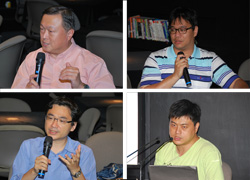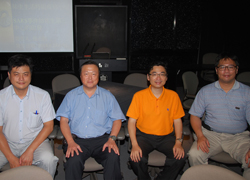Archilife Epidemic Disease Team MeetingDate: 2014-06-30
Section: Special Team Conferences | 氣候變遷速度、規模已加劇,末日四騎士(饑荒、疫病、民變、戰爭)已然現身,台灣雖處於相對安全區域,但已無法迴避輸入型災難,尤其是疫病傳染與糧食匱乏。因此,本會特於生活特組之下,再行召集疫病、農糧小組,分別就饑疫災難可能引發之議題進行研討,並以祐生生活研究中心及周圍區域為範疇,規劃相關的因應措施。其中,疫病小組組長為姚維正先生;組員包括:周裕清先生、吳元宏先生、楊正帆先生等,自2014年四月份起,陸續召開會議進行討論。茲將研討成果說明如下:
With rapid and exacerbated climate change, the Four Horsemen of the Apocalypse(Famine, Pestilence, Death and War)have emerged. Although Taiwan is situated in a relatively safe region, imported disasters cannot be averted, especially the spread of epidemic diseases and food shortages. Consequently, Archilife has convened the Epidemic Disease Team and Agriculture & Provisions Team under the Archilife Living Special Team to discuss possible issues that may be induced by famine and pestilence. Furthermore, using Archilife Living Research Center and the surrounding areas as the boundary, relevant contingency measures are devised. In particular, the team leader of the Epidemic Disease Team is Mr. Yao Wei-cheng, with team members including Mr. Chou Yu-ching, Wu Yuan-hung and Yang Cheng-fan etc. As of April 2014, several meetings have been convened to conduct discussions, and the outcome is summarized below:
 自2014年4月12日起至2014年6月21日止,共計召開十次會議,就下列議題進行研討並提出對應策略。關於氣候變遷下未來台灣自發型與輸入型疫病種類、傳播方式、分佈範圍與引發症狀之議題,該組除分析傳染疫病、新興傳染病、人畜共通疫病種類與可能造成影響外,並指出自發型疫病季節分佈,將受到氣候變遷影響;而輸入型疫病尚須評估鄰近國家複合型災難和氣候暴烈化、沙漠化程度才能做進一步評估。關於台灣都市化辦公與住宅空間對於相關疫病應有的預防措施之議題,考量密閉空間容易滋生微生物、病毒,該組除提出應裝設加熱換氣空調系統,結合靜電集塵器、光觸媒、化學消毒抗菌劑、紫外線、陰離子產生器、高效能空氣粒子濾網等設備,降低微生物、病毒對人體產生的危害外,並指出應培養正確洗手習慣,才能有效預防流行疫病的傳染。 自2014年4月12日起至2014年6月21日止,共計召開十次會議,就下列議題進行研討並提出對應策略。關於氣候變遷下未來台灣自發型與輸入型疫病種類、傳播方式、分佈範圍與引發症狀之議題,該組除分析傳染疫病、新興傳染病、人畜共通疫病種類與可能造成影響外,並指出自發型疫病季節分佈,將受到氣候變遷影響;而輸入型疫病尚須評估鄰近國家複合型災難和氣候暴烈化、沙漠化程度才能做進一步評估。關於台灣都市化辦公與住宅空間對於相關疫病應有的預防措施之議題,考量密閉空間容易滋生微生物、病毒,該組除提出應裝設加熱換氣空調系統,結合靜電集塵器、光觸媒、化學消毒抗菌劑、紫外線、陰離子產生器、高效能空氣粒子濾網等設備,降低微生物、病毒對人體產生的危害外,並指出應培養正確洗手習慣,才能有效預防流行疫病的傳染。
Between April 12 and June 21, 2014, 10 meetings were convened to discuss the following agendas and propose appropriate response strategies. As far as issues such as the types of idiopathic and imported diseases, propagation method, distance and symptoms under climate change are concerned, the team not only analyzed the impact of communicable epidemic diseases, emerging infectious diseases and zoonotic diseases but also pointed out that distribution of idiopathic diseases will be influenced by climate change. On the other hand, imported diseases must be further evaluated by taking into consideration compound disasters as well as the degree of extreme climates and desertification in nearby countries. As for issues such as urbanized work and residential spaces in Taiwan, disease prevention measures are discussed by considering the propagation of microbes and viruses in closed spaces. The team recommended installing HVAC (Heating, Ventilation and Air Conditioning) system integrated with features including electrostatic precipitator, photocatalyst, chemical disinfectant, UV light, ionizer and HEPA (High Efficiency Particulate Absorption) filter in order to minimize harm on the human body from microbes and viruses. Furthermore, the team also suggested the importance of correct hand washing routines in effectively preventing the propagation of epidemic diseases.
 關於規劃祐生潛盾計畫中心,做為居住於都市化辦公與住宅空間之祐生成員發病後,可提供三至五張床位的療癒處所,並提出對應之醫療設備、生理療養、心理調適、空間配置、藥物儲存等具體改良方案之議題,該組除針對潛盾計畫中心療癒空間進行規劃,並擬定廢棄物處理、隔離設備與管制原則等配套措施外,更指出應成立感染控制委員會,負責平常教育訓練與爆發疫情時人員管控,同時結合當地醫療資源才能營造健康、安全生存環境。面對詭譎多變的氣候變遷,期許疫病小組持續關注相關議題,在未來關鍵時刻,挺身而出研擬對應方案,與本會共同引領人類度過生存的考驗。 關於規劃祐生潛盾計畫中心,做為居住於都市化辦公與住宅空間之祐生成員發病後,可提供三至五張床位的療癒處所,並提出對應之醫療設備、生理療養、心理調適、空間配置、藥物儲存等具體改良方案之議題,該組除針對潛盾計畫中心療癒空間進行規劃,並擬定廢棄物處理、隔離設備與管制原則等配套措施外,更指出應成立感染控制委員會,負責平常教育訓練與爆發疫情時人員管控,同時結合當地醫療資源才能營造健康、安全生存環境。面對詭譎多變的氣候變遷,期許疫病小組持續關注相關議題,在未來關鍵時刻,挺身而出研擬對應方案,與本會共同引領人類度過生存的考驗。
Regarding the plan to convert Archilife Sub-Shield Center into a medical facility with 3~5 hospital beds in the event of Archilife members falling ill in urban work and residential environments, the team proposed improvement plans on related medical facilities, physiotherapy, metal adjustments, spatial arrangements and drug stockpiles. Apart from planning the medical space of the Archilife Sub-Shield Center, the team also drew up measures for waste disposal, quarantine facilities and regulations. Moreover, the team recommended setting up an Infection Control Committee in charge of regular education, training and personnel management during an outbreak. At the same time, local medical care resources must be incorporated to create a healthy, safe environment for survival. Confronted with the dynamic, changing climate, it is hoped that the Epidemic Disease Team will continue to monitor relevant issues and formulate appropriate contingency plans during critical moments in the future, thereby assisting humanity to pass the test of survival.
|
|